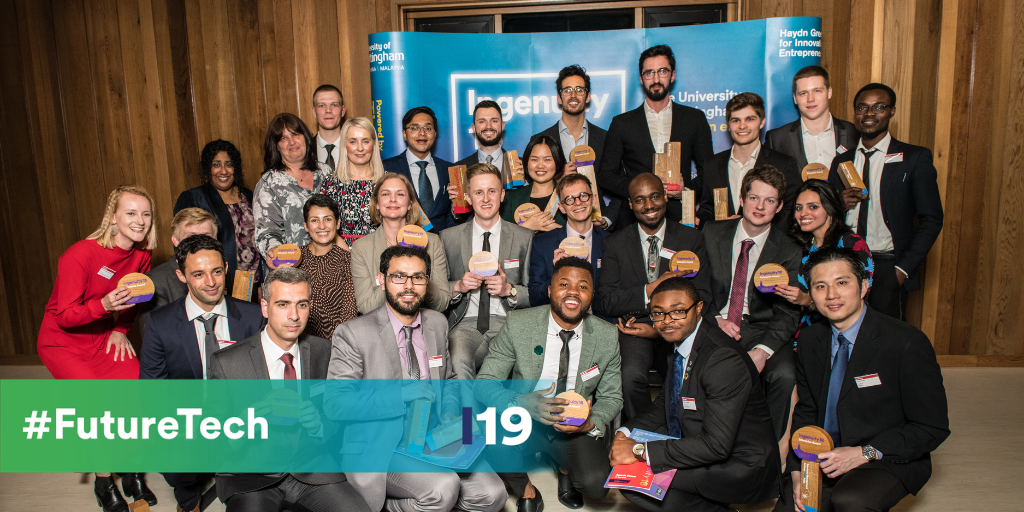
January 11, 2019, by The Ingenuity Lab
Ethical technology: in the (A)I of the storm? Say hello to the Ethical Technology Index (ETI)
How does technology enable interaction? How do we prepare for the emerging role of artificial intelligence, machine learning and the Internet of Things? And how will future societies function with these technologies?
In our Future Technology Summit, we’ll look at all of this and more, while helping participants to create scalable, global solutions to make Nottingham a thriving ‘Tech City’. By exploring tech-related consumer trends, we’ll discover how participants can build their own technology businesses. Finally, we’ll explore humans’ ongoing relationship with technology, and how this knowledge can be used to create future-proofed, Nottingham-based businesses with global impact.
Why do we swipe left or right to find love? Why are certain apps or technologies seemingly so addictive? Leah will offer an introduction to the psychology of technology, to help us understand the ‘tricks of the trade’ but also offer us essential ethical frameworks for design.
With the Future Technology Summit a little over a month away, Leah has provided us with some insight on the future of technology and the Ethical Technology index.
If you’ve been thinking that an artificially intelligent, virtual cyborg might be about to steal your job, drive your car, make better jokes than you and have better luck on Tinder, then you’re not alone! Research suggests that AI is expected to impact almost all aspects of our lives from our employment, our health care, our consumer choices and romantic lives (Makridakis, 2017; Courtois & Timmermans, 2018).
But how consumers feel about the technology they use and the impact it really has on everyday life is often lost in a sea of opinion and hype – from doomsday predictions to utopian fantasies.
How do we screen out the noise and understand how the technology we use affects our day-to-day life? And how do we know what impact it will have on society in the future?
Working at the intersection of technology development and human psychology, we’ve been researching the factors which will lead to the development of more ethical technology products and services – and support human values. We are questioning the ways in which the applications and services we use may both positively and negatively impact our cognitive, social and biological selves, and how technologies like AI, big data and machine learning affect us at a societal level.
Our work in this area has led to us develop a tool which enables more ethical development of technology – and guide ethical investment. The ethical technology index (the ETI) is designed so that companies can benchmark the ethical impact of their products and services, and track how this impact changes over time and with user uptake. The ETI will provide a framework and data for understanding what ethically good looks like: no more opinion, hype or doomsday predictions. If tech is meeting requirements for being ethically good, the ETI can quantify how – and why.
Using the ETI could particularly enable start-up companies to stand out from the crowd – helping them to develop high performing products and leverage ethical investment. The reality is, there are barriers to embedding ethical practice into design. One identified barrier is the use of Agile methodologies which focus on fast ‘sprint’ development cycles (Abdulhalim, Lurie & Mark, 2018). Although innovative, the Agile approach often doesn’t leave time for ethical assessment. Our aim is for the ETI to help start-ups create ethically good products from the get-go, by incorporating it as a practical tool within the Agile sprint. For example, through answering a series of questions, a product could be assessed at multiple iterations on how it could affect consumers’ psychological wellbeing. This type of ongoing assessment will provide important insights for start-ups who are honing their products and services. What’s more, research shows that including ethical tools within the Agile process is linked to increased product performance, particularly when they are adopted at the start of the process (Abdulhalim et al., 2018). Using a tool to create an ethically good product then, is surely a no brainer for both developers and investors.
In developing the ETI we are working with technology creators, consumers business and government. We are also keen to hear from start-ups who want to embed ethical practice into their business. If you’re working in any of these areas and have an interest in developing ethical technology, we would love to hear from you.
Drop us an email: hello@i2mediaresearch.com
Ingenuity19 is looking for the next generation of entrepreneurs and innovators to create scalable social and commercial enterprises that can transform Nottingham, the UK and beyond.
For the first time, we are open to the public and looking for future leaders from across the city. This includes everyone from the student community, to Nottingham’s biggest businesses, as well as those from the public and third sectors. We are looking for everyone to come together and discover problems worth solving, and are offering you the tools to create scalable sustainable solutions.
Register for Ingenuity19 now: nottingham.ac.uk/ingenuity19/
No comments yet, fill out a comment to be the first

Leave a Reply